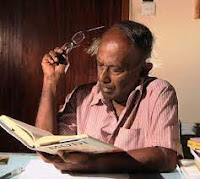A
book written in Sinhala about Pablo Neruda and his work was launched in
October 2016 at the Library Services Board auditorium. It was the
second print of ‘Ceilan doopathe deepthimath hudekalava (En Ceilán: La Soledad Luminosa),
Indrani Rathnasekara’s translation of a selection of Neruda’s writings.
It is one of the many books she has translated directly from the
original Spanish to Sinhala. This alone is remarkable.
The task Indrani set for herself was certainly formidable — it is harder to translate poetry than it is to translate prose. There’s a greater possibility of losing nuance in the former. I do not know Spanish, so the true worth of her translations in terms of being faithful to the original Spanish has to be ascertained by someone well versed in both Sinhala and Spanish. That said, I still remember being delighted by what she offered. They were, to my mind, quite ‘Nerudian.’
This, however, is not about translations and their relative merits. It is about some comments made at the book launch. W A Abeysinghe, poet, lyricist, journalist, prolific writer, lawyer and administrator, has lived an epic life, in and out of literature. I wrote about him a few years ago, capturing a minuscule slice of his epic story under the title, ‘W A Abeysinghe, the villager wielding an insomniac pen.’
Having lost Indrani’s number (I wanted to know the titles of the books launched that day), I called Abeysinghe Mahaththaya. It was wonderful to be told that even at the age of 84, he is still writing and that a collection of 50 essays has just been published. He didn’t have the number, but Prem Dissanayake of Fast Publishers, who had brought out a few of her books, did.
Not in the best of health and yet not having lost an iota of her enthusiasm for literature, especially Spanish literature, Indrani informed me that she has translated three plays of Federico García Lorca and that the collection is to be published shortly by Godage Publishers. The phone conversation ended with a promise: I will visit and interview her.
Back to our story. W A Abeysinghe spoke at the event. He offered some wonderful insights about Neruda specifically, about world literature broadly and the place of Sinhala literature within it. At one point he read out a poem in Sinhala.
I had also been invited to speak and at some point realised where I had heard the poem. It was an English translation of a poem that’s at the end of an Italian film called ‘Il Postino (The Postman),’ about the time Neruda spent part of his exile in an Italian fishing village around the time of the coup in Chile (1973). Interestingly, the story is based on the 1985 novel ‘Ardieente Paciencia (Burning Patience) by Antonio Skármeta, which he adapted from a film he wrote and directed in 1983. A beautiful and appropriate poem to end a fascinating, sad and yet hopeful story, I’ve always felt.
I used the poem as a window, drawing from the playful exchange between the postman and the postmaster, i.e. Neruda the Poet of the People or Neruda the Love Poet. I added my two-cents worth to what W A Abeysinghe had said, roughly translatable as follows:
I caught Abeysinghe Mahaththaya’s eye as I finished. I saw his inimitable chuckle but also noticed he was nodding his head.
The world knows Neruda. In my piece about Abeysinghe Mahaththaya, I observed the following: When Sinhala lyricists are talked about there are certain names that tend to be left out of the conversation.’ I mentioned Sunil Sarath Perera, Mahinda Algama and W.A. Abeysinghe, and noted that this should not surprise anyone considering that Mahagama Sekara is also frequently forgotten, bypassed or footnoted.
That’s how truly small we are, I now feel.
['The Morning Inspection' is the title of a
column I wrote for the Daily News from 2009 to 2011, one article a day,
Monday through Saturday. This is a new series.]
Other articles in this series:
Paul Christopher's heart of many chambers
Calmness gracefully cascades in the Dumbara Hills
Serendipitous amber rules the world





0 comments:
Post a Comment